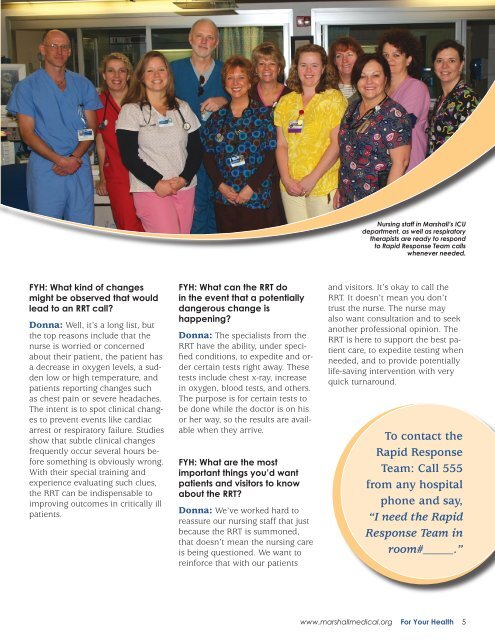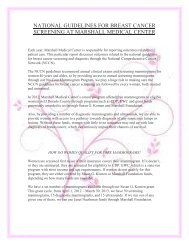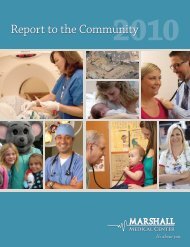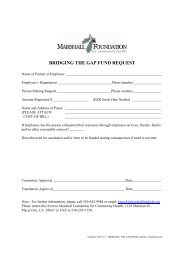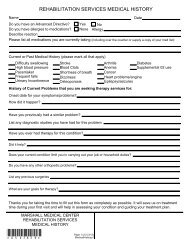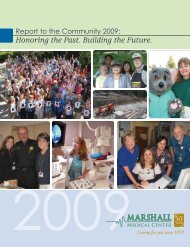A NEW TEAM - Marshall Medical Center
A NEW TEAM - Marshall Medical Center
A NEW TEAM - Marshall Medical Center
Create successful ePaper yourself
Turn your PDF publications into a flip-book with our unique Google optimized e-Paper software.
Nursing staff in <strong>Marshall</strong>’s ICU<br />
department, as well as respiratory<br />
therapists are ready to respond<br />
to Rapid Response Team calls<br />
whenever needed.<br />
FYH: What kind of changes<br />
might be observed that would<br />
lead to an RRT call<br />
Donna: Well, it’s a long list, but<br />
the top reasons include that the<br />
nurse is worried or concerned<br />
about their patient, the patient has<br />
a decrease in oxygen levels, a sudden<br />
low or high temperature, and<br />
patients reporting changes such<br />
as chest pain or severe headaches.<br />
The intent is to spot clinical changes<br />
to prevent events like cardiac<br />
arrest or respiratory failure. Studies<br />
show that subtle clinical changes<br />
frequently occur several hours before<br />
something is obviously wrong.<br />
With their special training and<br />
experience evaluating such clues,<br />
the RRT can be indispensable to<br />
improving outcomes in critically ill<br />
patients.<br />
FYH: What can the RRT do<br />
in the event that a potentially<br />
dangerous change is<br />
happening<br />
Donna: The specialists from the<br />
RRT have the ability, under specified<br />
conditions, to expedite and order<br />
certain tests right away. These<br />
tests include chest x-ray, increase<br />
in oxygen, blood tests, and others.<br />
The purpose is for certain tests to<br />
be done while the doctor is on his<br />
or her way, so the results are available<br />
when they arrive.<br />
FYH: What are the most<br />
important things you’d want<br />
patients and visitors to know<br />
about the RRT<br />
Donna: We’ve worked hard to<br />
reassure our nursing staff that just<br />
because the RRT is summoned,<br />
that doesn’t mean the nursing care<br />
is being questioned. We want to<br />
reinforce that with our patients<br />
and visitors. It’s okay to call the<br />
RRT. It doesn’t mean you don’t<br />
trust the nurse. The nurse may<br />
also want consultation and to seek<br />
another professional opinion. The<br />
RRT is here to support the best patient<br />
care, to expedite testing when<br />
needed, and to provide potentially<br />
life-saving intervention with very<br />
quick turnaround.<br />
To contact the<br />
Rapid Response<br />
Team: Call 555<br />
from any hospital<br />
phone and say,<br />
“I need the Rapid<br />
Response Team in<br />
room#_____.”<br />
www.marshallmedical.org For Your Health 5


